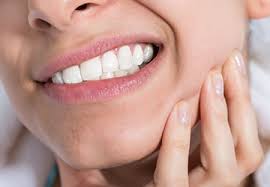Definition of TMJ
 TMJ stands for temporomandibular joint, which is your jaw joint. Everyone has two of these: a left and right. TMJ syndrome or TMD (temporomandibular disorder) is a medical problem related to the function of the jaw joint. This typically manifests itself as a popping, clicking, or rustling in the jaw joint and can be accompanied by jaw joint or muscle pain, a jaw that locks in position or is difficult to open, headaches, fullness or ringing in the ears, and even numbness in the face and fingertips.
TMJ stands for temporomandibular joint, which is your jaw joint. Everyone has two of these: a left and right. TMJ syndrome or TMD (temporomandibular disorder) is a medical problem related to the function of the jaw joint. This typically manifests itself as a popping, clicking, or rustling in the jaw joint and can be accompanied by jaw joint or muscle pain, a jaw that locks in position or is difficult to open, headaches, fullness or ringing in the ears, and even numbness in the face and fingertips.
Types of TMJ Problems
TMJ disorders generally fall into three categories:
- Myogenous TMJ problems are the most common type of TMD, accounting for over 80% of the total. Myogenous TMJ disorders involve muscle related pain and manifest as discomfort in the jaw, temple, neck or shoulder muscles– especially upon waking. This type of TMJ problem responds well to BOTOX®treatment and nightguards that control clenching. Nightguards that only treat grinding are typically much less effective (this is the type found in drugstores).
- TMJ disorders can also involve jaw joint generated pain. This results from internal derangement of the TMJ, which can involve a dislocated jaw, displaced disc within the TMJ or injury to the condyles (the rounded ends of the lower jaw that fit up into the jaw joint).
- Another type of TMJ problem involves degenerative joint disease, such as osteoarthritis or rheumatoid arthritis.
Many TMJ problems can be treated by dentists. However, internal derangements and degenerative joint disease may require the additional involvement of a physician.
Causes of TMD and the Link to Stress
TMJ problems in a minority of cases are caused by a blow to the face or arthritis of the jaw joint. Most commonly, TMJ pain is related to genetic predisposition and stress level. TMD tends to cluster in high stress professions (physicians, lawyers, consultants, traders, etc.) and is more likely to occur when the individual is experiencing a high level of stress. This stress leads to teeth grinding and clenching and the associated head, neck and shoulder pain.
In a very small percentage of cases (estimated at less than 5%), TMJ appears to have arisen due to a problem with the patient’s bite or occlusion. This could be a result of the teeth simply growing into a suboptimal position (thereby affecting the bite) or as a result of braces or orthodontics.
TMJ Treatment Relies on a Custom Fitted Nightguard
Individuals experiencing symptoms of prolonged pain or sensitivity may require treatment for their TMJ problem. In a very small minority of cases, the bite may be so compromised that it has to be rebuilt—due to suboptimal tooth or jaw position—utilizing numerous crowns and veneers. And in some cases, orthognathic surgery or orthodontics may be indicated. Extreme surgical intervention, involving jaw joint disc replacement, is typically not recommended—this procedure has met with limited success.
For the vast majority of patients, however, the TMJ problem can be treated with a specially designed, plastic guard that is worn over the teeth at night.
It is very important to realize, though, that the guard be must be customized to the individual’s particular situation. One size fits all solutions (like nightguards available in drugstores) may not solve the problem and can even make it worse. This occurs since everyone’s TMD is different: some individuals are almost pure grinders, others clench but don’t grind, some grind sideways and clench just a little, some clench and grind both, etc.
In summary, a nightguard has to be custom-designed to treat the particular type of TMD the individual is experiencing. This may require a visit to a TMJ dentist that has received advanced postgraduate training (currently thought to be less than 1 in a 100 dentists).

